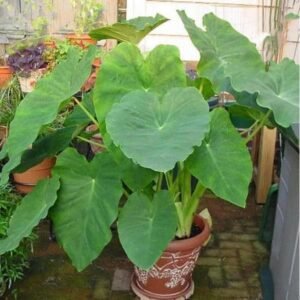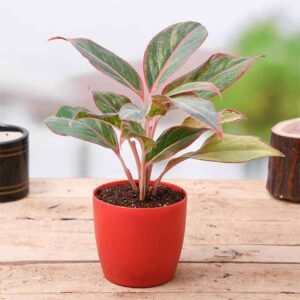Description
Money Plant (Green Plant) – A Complete Description
The Money Plant, commonly known in botanical terms as Epipremnum aureum, is one of the most popular and widely grown houseplants around the world. Loved for its lush green foliage, easy maintenance, and symbolism of prosperity and good luck, the money plant is a favorite in homes, offices, and indoor gardens. It is also known by other names such as Devil’s Ivy, Golden Pothos, and Hunter’s Robe, and belongs to the Araceae family.
1. Physical Appearance
The Money Plant is a trailing or climbing vine with heart-shaped, glossy, bright green leaves. Some varieties may have yellow, white, or pale green variegation, depending on the cultivar. In the wild, it can grow over 30 feet tall, but indoors it remains much smaller. It produces long vines that can trail over pots, climb trellises, or hang attractively from baskets.
Its leaves grow alternately on long, flexible stems. When grown outdoors in tropical climates, the plant can develop much larger leaves and occasionally produce flowers, although flowering is extremely rare in indoor conditions.
2. Origin and Habitat
Native to the Solomon Islands in the South Pacific, the Money Plant thrives in tropical and subtropical climates. It naturally grows under the shade of trees, climbing their trunks and spreading across the forest floor. Due to its adaptability, it has become naturalized in many parts of the world and is now a staple indoor plant in Asia, Europe, the Americas, and Africa.
3. Symbolism and Cultural Significance
In many cultures, especially in India and Southeast Asia, the Money Plant is considered a symbol of wealth, prosperity, and good fortune. According to Feng Shui and Vastu Shastra, placing a Money Plant in the southeast direction of your home or office is believed to bring financial success and remove negative energies. Its round, flat leaves resemble coins, which is thought to attract abundance.
Many people also believe that the plant should be received as a gift rather than bought, to bring maximum luck and prosperity. It is commonly given during festivals, housewarmings, and business openings.
4. Varieties of Money Plant
Several varieties of Epipremnum aureum are cultivated for ornamental use:
- Golden Pothos – Known for its vibrant yellow-green variegation.
- Marble Queen – Features white and green marbled leaves.
- Neon Pothos – Bright neon-green foliage with a modern look.
- Jade Pothos – Solid green leaves without variegation.
- Manjula Pothos – Curly, heart-shaped leaves with white and green patterns.
Each variety offers unique aesthetic appeal and thrives well in indoor conditions.
5. Growing Conditions and Care
The Money Plant is a low-maintenance and hardy plant, which makes it ideal for beginners.
Light Requirements
It prefers bright, indirect sunlight, but can tolerate low-light conditions. Direct sunlight can scorch the leaves, while total darkness may cause poor growth and leaf yellowing.
Watering
Water when the top inch of soil feels dry. Overwatering can lead to root rot, so good drainage is essential. Underwatering, on the other hand, may cause the leaves to droop.
Temperature and Humidity
The plant thrives in temperatures between 15°C to 30°C (59°F to 86°F) and enjoys moderate to high humidity. It does not tolerate frost or cold drafts.
Soil and Potting
A well-draining potting mix, preferably with peat, perlite, and compost, works best. Repotting may be needed every 1-2 years, especially when roots outgrow the pot.
Fertilization
A balanced, water-soluble fertilizer can be used once a month during the growing season (spring and summer). Avoid excessive fertilization.
Pruning and Propagation
Regular pruning helps maintain the shape and encourages bushier growth. The plant can be easily propagated through stem cuttings, which can root in water or soil.
6. Health and Environmental Benefits
Besides its aesthetic value, the Money Plant offers several health and environmental benefits:
- Air Purification: According to NASA’s Clean Air Study, the plant is effective in removing indoor pollutants such as formaldehyde, benzene, and xylene.
- Oxygen Production: It helps increase oxygen levels and contributes to cleaner indoor air.
- Stress Reduction: Keeping greenery indoors is known to reduce stress and improve focus and productivity.
- Humidity Control: It naturally increases indoor humidity, which can be helpful in dry climates or air-conditioned rooms.
7. Common Problems and Solutions
Despite being hardy, the Money Plant can sometimes face issues:
- Yellowing Leaves: Caused by overwatering, poor light, or nutrient deficiencies.
- Root Rot: Typically from soggy soil – repotting in fresh soil and reducing watering helps.
- Pests: Occasionally affected by mealybugs, spider mites, or aphids. Wiping leaves with neem oil or insecticidal soap helps control infestations.
8. Indoor Decoration Uses
The Money Plant’s lush foliage and climbing nature make it ideal for a variety of decorative uses:
- Hanging baskets or pots on shelves.
- Trellises or moss poles to train climbing vines.
- Tabletops or office desks for a touch of greenery.
- Living walls or vertical gardens for a striking natural display.
It pairs beautifully with modern and traditional interiors alike and suits minimalist décor.
9. Toxicity
While the Money Plant is generally safe for humans, it is considered mildly toxic to pets like cats and dogs if ingested, due to the presence of calcium oxalate crystals. Symptoms may include mouth irritation, vomiting, or difficulty swallowing. It’s best to keep it out of reach of pets.
10. Spiritual and Emotional Impact
Many believe the Money Plant not only brings financial growth but also promotes peace, harmony, and emotional stability. It is thought to absorb negativity from the surroundings and create a calming environment. Keeping a green plant indoors also encourages mindfulness, patience, and a connection to nature.
Conclusion
The Money Plant is more than just a decorative houseplant. It symbolizes prosperity, positivity, and well-being, and is easy to care for even by those new to gardening. Whether placed in a home, workplace, or spiritual space, it brings a refreshing touch of green and a reminder of growth, luck, and abundance. With minimal effort, anyone can enjoy the aesthetic and health benefits that come from nurturing this beautiful green companion.








Reviews
There are no reviews yet.